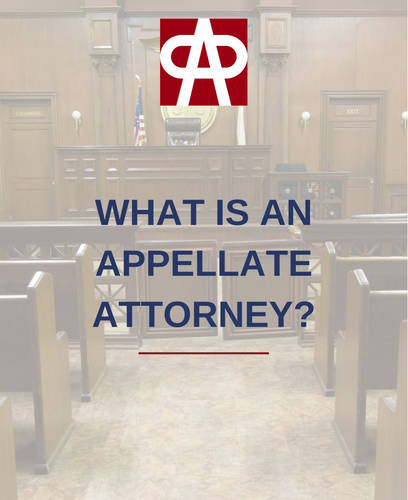
If you are unhappy with the outcome at trial, you may have been told to contact an appellate lawyer. What is an appellate lawyer and how can one help you?
An appellate attorney handles appeals. An appeal is a process that asks a higher court to review the decision made a lower court. An appeal is filed when a client and their attorney believe that a mistake was made that impacted the outcome of their trial. Appeals take place in both state and federal courts. In some instances, appealing an unfavorable decision is a right; in other instances, whether an appellate court considers to hear an appeal is a discretionary decision.
The litigant who files the appeal is called an appellant and the litigant on the opposing side is called appellee.
An appeal cannot be filed simply because one party is dissatisfied with the outcome of the initial case, there must be legal grounds for the appeal, meaning the trial judge made a mistake.
Examples include:
An appellate attorney can review a case to determine if grounds for appeal exist. This review will cover the entire record, including trial transcripts, evidentiary materials, and motions. It is important to contact an appellate attorney as soon as possible because there is only a short period of time during which an appeal can be filed.
The typical steps in the appeal process include:
The appellate court will review the submitted documents and determine if there are indeed adequate grounds to file an appeal.
The appeals process is not a retrial of the case but is simply a review of what occurred. If an appeal is granted, the appellate court will remand the case back to the trial court. Instructions on how to fix the errors made in the lower court will be provided. If it is determined that an error impacted the verdict, the appellate court can order that a new trial take place.
Although appeals must be filed quickly, it can take some time for a decision to be made. The length of any appeal case is impacted by the schedule of the court, the merits and complexities of the case, and whether the appeal is filed in the state or federal court.
In Washington State, appeals frequently take 14-24 months. Appeals in federal courts can take longer, 24 months or more.
The cost of an appeal can varies greatly depending on the case and factual issues. In many circumstances, an appeal can be arranged on a fix-fee basis. In general, however, the fees and costs associated with an appeal are quite expensive given the time and effort required to pursue an appeal.
Trial lawyers and appellate lawyers have very different skill sets. Appellate lawyers bring a fresh set of eyes to a case, are well versed in how the appellate courts work, and are familiar with framing arguments that can be successful with in an appellate court.
To learn more about how an appellate lawyer can assist you, contact Athan Law at (509) 215-4679.
Disclaimer: The information provided on this article is for educational purposes only and is not intended as legal advice. Every case or situation is unique, and you should consult with a licensed attorney before taking any action. No attorney-client relationship is formed by downloading or reading this article.
Posted February 02, 2023
